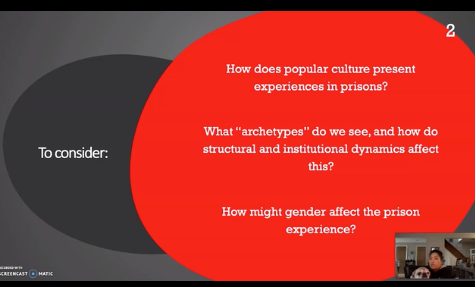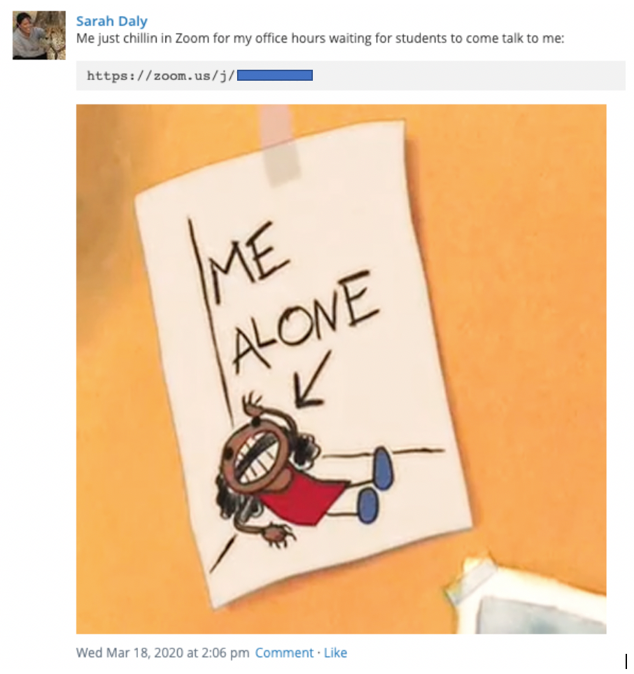When academics encounter a challenge, we face it head on

Almost one year ago to the day, I wrote an article for Editage about my own imposter syndrome and “the whisper that tells me I need to do more do better.” Dear 2019 Sarah, let me tell you a story about what’s coming in 2020.
It’s a well-known fact that many academics are overachievers. We’ve made careers of learning, researching, reading, teaching, writing, studying, and then reading more. In our own fields, we refuse to accept “I don’t know,” and replace it with, “let’s see what the research says.” We scour through journals and books until we have even more questions, and then we create studies to answer them. Suffice to say, when academics encounter a challenge, we face it head on.
So, when, in the face of Covid-19, many colleges and universities moved to online courses, professors everywhere began the arduous and daunting challenge of remote teaching. And meet the challenge they did. Colleagues from my own institution and across social media began sharing resources from books to websites to best practices to help for the technologically impaired. We asked and answered questions, uploaded content and materials to use across courses, and came together in the best ways possible. We learned everything we could in a trial by fire situation, and at my own college, Saint Vincent, and around the world, we really out-academic’d ourselves.
Online vs. In-Person
In the time we took to revise all of our grand plans for the semester, many of us recognized that we were losing something meaningful. While many people know that academics are all a bunch of overachievers who read too much, fewer people understand that lots of us genuinely love teaching. Sure, I’m jazzed that sweatpants and a dress shirt are an appropriate work uniform now, or that I can only need to throw on eyeliner and pencil in some eyebrows—I call all of this the 50 percent life—but I choose to make a teaching college home because I am an educator at heart.
I enjoy the social element of teaching and the interactions with students. The conversations and heated debates that we had in class just don’t spark the same excitement in me as they do on a discussion board. I miss seeing my students, learning from them, and having conversations with them before and after class. Those small college interactions and relationships that I have are the reason that I love my job, and that’s missing from my everyday life now. I check in with students via email, host Zoom office hours (more on that later), and talk on the phone with them, but the organic nature of those connections feels strained and frantic now. This isn’t tending to a garden full of budding minds; this is putting out little fires every day.
Social media: Friend or foe?
The mourning period for those losses was cut short by the urgent need to make a plan for the rest of the semester. As is common in these times, I sought answers (and levity) from social media. It was also a welcome break from the notorious and pervasive reply all emails that invaded my inbox.
The academics sprang into action, doing what we do best: teaching. #AcademicTwitter went bananas sharing our best resources and suggestions. Professors offered to guest lecture for each other in virtual classes. We uploaded content and brainstormed about projects online. Others shared surveys that they used to check in with students and assess their needs and limitations while learning online. They reminded us to err on the side of leniency and compassion. Dr. Andy Wilczak worked to create a library of criminology and criminal justice content that we could all use, offering his podcast @UntenuredTracks as YouTube videos for class material.
Amidst the recommendations and the mountain of information, our feeds were dotted with (or overtaken by) witty memes about quarantine, COVID-19, a newfound appreciation for teachers, and Tiger King. I posted funny updates about days three, eight, and 14 of quarantine, and I roared at every Joe Exotic picture I encountered. What a time, indeed.
In the past week or so, though, I’ve noticed the tone moving from “humor will get us through this” to 140-character stories about loved ones who have died, the scenes in the most overwhelmed and understocked hospitals, and the struggles of our students. It’s hard to escape the crushing weight of sadness, turmoil, instability, leadership foibles, the stories of chaos in prisons, and the fear for our most vulnerable.
I lived in New Jersey and worked as a high school teacher during Hurricane Sandy. Although I was further inland near Philadelphia and escaped much of the damage that the hardest-hit areas experienced, I still remember feeling like it was an emergency. The sky was ominous, and trees fell all throughout my neighborhood. Transformers exploded, and my power went out for days. I ate pudding packs for three days and didn’t go to work. I read books by candlelight and knew that there would be a return to normalcy. It was something I understood and experienced.
But now, the weather is changing, and we may be fully in the throes of spring. The sun is shining, and the leaves are returning to the trees, but we are facing a crisis of which we have never seen the likes. I don’t know how to process any of it.
Zooming into online teaching
In the midst of grappling with all of it, I was still scrambling to deliver high-quality content to my students. Surely, in the midst of a global pandemic with financial collapse looming for our country, they would still be craving meaningful lectures about my Culture and Crime course. Not only did I want to continue teaching, I wanted my personality to shine through and offer them a glimmer of hope or a distraction from the world outside of our quarantine shelters. I filmed videos with my dog in my lap. (Piggy was less than excited about her newfound fame, and she even grew bored of my lectures.) I changed my Zoom backgrounds to funny memes or the set from The Office. I considered wearing a unicorn onesie with a rainbow backdrop (but I suppose I had to draw the line somewhere).
And despite all of that, combined with the obviously fascinating content of the field to which I’ve devoted my life, most of the students tolerated me (at best) and ignored me (at worst). I took many of my colleagues’ suggestions and struggled to balance leniency with the expectation that I deliver quality content. For a while, I thought that if I worked hard enough, I could teach as effectively as I would have in the classroom.
I also totally ignored that fact that my own colleagues and academics around the world have made entire careers of teaching and learning about online pedagogy. There are dissertations and degree programs and semester-long courses to the technology, software, and strategies for virtual classrooms, but somehow I (and many of my colleagues) thought we’d master this in a week. We’re ambitious, if nothing else.
As I learned from my students, they’re struggling to adapt to many conditions that we consider to be everyday life. Many professors are moving the goalposts or adding more (not less!) work, assuming that students have more time to read, learn and type about the burning questions from our courses. They complain that each professor has a different approach: asynchronous vs. synchronous; longer papers vs. timed exams; Zoom vs. Schoology Conferences; discussion boards vs. live Google Docs. They lament that they receive too many emails. I sat back to think about how too many emails is my baseline in my life, but I wondered what it would have been like to go from receiving five relevant, urgent emails in a day to 20.
I was making students engage while also grappling with the knowledge that many of the students are juggling with additional responsibilities and limited resources. I essentially forced them into watching my videos by embedding the weekly quiz questions in the slides (that weren’t included in the PowerPoint file that I also shared with them). I somehow forgot that they often didn’t read for my daily classes, and instead, I assumed that they needed to see my face (and my dog) to learn.
I was waiting in my Zoom office hours everyday, thinking that all the students would flock to me for guidance and help. Instead, I sat at my computer, doing three other things, waiting for the chime to tell me that a student had arrived in the waiting room. I shared funny memes to encourage them to come talk to me, but no more than one per day came to talk.
I was incorrectly thinking that students could balance all of their courses and the other issues in my life, and that if they couldn’t, they would turn to me for help. I gave them (and myself) a break during random weeks to get organized and take a breather, but I believed that after that week, they’d come back refreshed and eager to learn as if the same limitations from the week before were suddenly remedied. They were still juggling jobs, family obligations, siblings in their home, shared computers and limited wi-fi, and—oh, you know—a global pandemic that’s wreaking havoc and was, at one point, projected to cause 100,000 deaths. They’re mourning the own loss of their time on-campus, in the classroom and with their friends, their final months before graduation, and the ceremonies and experiences that have been indefinitely postponed or cancelled. And they’re trying to process this while they complete assignments and participate in Zoom meetings and try to find a quiet place in their home.
Working from home
I’m not insensitive about the need for a space to work in peace. I don’t have children, and I understand that many students and professors do while struggling to do all of this. I can’t even fathom how that would work, and I have nothing but respect for those who are managing to raise children in this time. My home is generally a quiet place so that’s never been a problem, but I also happen to live in a city next to the loudest family on earth. The three kids run around outside and scream, and their parents scream at them from the house. I can tell you what they’ve eaten for lunch today, that they need to put jackets on, that Kid #1 hit Kid #2 in the face with a whiffle ball bat, and that they need to practice the piano. (This week’s lesson was the first seven notes of “Seven Nation Army” by The White Stripes. On repeat. For hours.) It’s been an interesting background distraction for my recorded videos. I’m about four more stressful workdays away from yelling “Get off my lawn!” and angrily slamming my windows. I feel like I’m about 40 years too young for that, but I guess we’re all going through some things.
I saw another meme (in the transition time between funny and awful on social media) that said that this current time “isn’t working from home, but living at work,” and it’s the truest statement I think I’ve ever read. Yes, I can throw a load of laundry in between videos, but I can also realistically work for 13 hours a day addressing the myriad issues that are flooding my inbox. The boundaries are unclear now, and when everyone needs something “rightnowyesterday,” it’s hard to know where to draw the line.
I wrote in 2019 that I thought the dissertation was the top of the mountain, but it “was more like Base Camp 1.” Being an assistant professor working toward tenure always provided me with the temptation to do more and do better to stave off feelings of imposter syndrome. Here we are, a year later, and COVID-19 has been like an avalanche. In addition to dealing with teaching and work issues, I’m struggling to understand the world we live in, lamenting that I’m 250 miles away from my best friends and family, and wondering if there’s an end in sight to this. I’m having crazy dreams and not sleeping on a normal schedule, although that may be due to reading the news before bed.
The guilt of luck
And yet, through all of this, I feel like I can’t complain about anything. I have so much for which to be thankful! I’m healthy, and my family is safe. I have the resources to stay at home for weeks, and I have the knowledge, skills, and [relative] quiet to do my job at home. And, perhaps most importantly, I still have a job and an income. Who am I to complain about too much work to do when there are other people who are desperate for a job? The audacity to complain or lament my current conditions offends my own sense, so I don’t take too long to sit with these thoughts (until now).
I wanted to find a way to help, but I’m almost out of ideas. I can’t volunteer to grocery shop for my neighbors, because my partner is a firefighter who is still working. If he gets the virus, he’ll undoubtedly bring it home to me, and I could be asymptomatic and spread it. I can’t sew, so making facemasks is out. I can bake, but I’ve baked so much and given so many cupcakes away that if I keep it up, I risk giving everyone I know diabetes.
Instead, I’ve looked to help others through the skills that I have (that won’t send their blood sugar through the roof). As an assessment coordinator for the college, I hosted a workshop on alternative assessments for final exams. I offered them resources (but not too many, because, again, we’re all a bunch of overachievers who want to learn everything) and assistance. The college also presented it as “Virtual Assessment Happy Hour” which I highly recommend. Apologies to the Vice President of Academic Affairs who was on the call and observed me rolling up on Zoom with a Natural Light Seltzer (which I also recommend).
I’ve also stayed connected with as many people as I can. In the past few weeks, I’ve spent hours on the phone with friends. We’ve played games, and even dug out old pictures that we were always too busy to search for. (This also was good motivation for me to go on a diet during this time to get back to my college weight.) We vent, we laugh, and we make plans for whenever things go back to normal.
I’ve stepped back a bit from work, allowing a reasonable amount of time or a standard workday be enough for each day. I’ll still make videos that feature Piggy, and the onesie isn’t out of the question yet, but I want to recognize and remember the weight of the world right now and the relative importance of my courses. I also still offer help to students in any way that I can, but I won’t take it personally if they don’t accept it. I might still send funny memes about me alone in my Zoom office hours, though.
Most importantly, I’ll find ways to stay sane and calm in this hot mess of a time. I want to take time to step away from Zoom, my email, my laptop, and those dreadful daily press conferences. I’ll keep cooking new recipes that I always wanted to try, and I’ll find more old pictures to share with my friends. I plan to keep writing my book on my current research, which had basically come to a grinding halt in the middle of March. I even started painting again with the help of YouTube videos (shout out to Feliks K and his awesome tutorials). And in the midst of the chaos, I even took a few hours to write about all of this as a catharsis or a reflection or something to make sense of what’s happening to all of us. I’ll remain grateful for all the luck that I have and wish for the best for all of us. And, as I said in April 2019, I will repeat this to myself everyday: “I did my best, and my best is good enough.”
Read the other posts in our COVID-19 and academia series:







